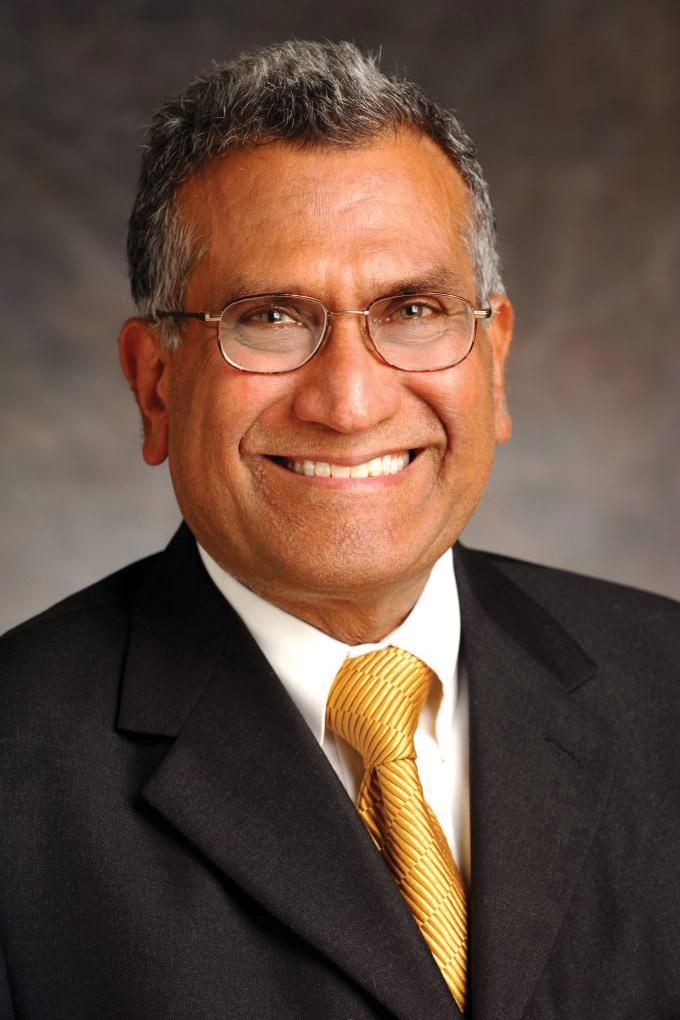A Novel Concept for Flash Evaporation and Phase Separation for Desalination
The next presentation in the Distinguished Lecture Series in Energy, featuring Dr. Vijay K. Dhir, a Distinguished Professor of Mechanical and Aerospace Engineering and former Dean of the of the Henry Samueli School of Engineering & Applied Science at the University of California, Los Angeles, will be held on Monday, August 28, 2023, from 1:00 p.m. – 2:00 p.m. CDT (UTC -5:00). The topic will be “A Novel Concept for Flash Evaporation and Phase Separation for Desalination.”
Abstract
A novel system combining flash evaporation and vapor separation for desalination of seawater is described. The solar-heated saltwater flows through injection tubes which are connected to injector passages installed tangentially onto a separator tube. Flashing in the injection tubes and passages occurs as a result of pressure drop. The centrifugal force from tangential injection separates vapor from liquid. Vapor is directed to a condenser to produce potable water. The separated liquid returns back to the source of heated water. With a two-stage system and seawater with a salt concentration of 2.5% by mass, collected condensate had a salt concentration of less than 0.02% which is comparable to that of tap water.
Biography

Vijay K. Dhir, a distinguished professor of mechanical and aerospace engineering, served as the dean of UCLA’s Henry Samueli School of Engineering & Applied Science from 2003 to 2016.
Born in India, Dhir received a Bachelor of Science degree from Punjab Engineering College in Chandigarh, India, and a Master of Technology degree from the Indian Institute of Technology in Kanpur, India. He received a Ph.D. from the University of Kentucky. Dhir joined the faculty at UCLA in 1974 and served in several leadership roles before he was appointed Dean.
In 2006, he was elected to the National Academy of Engineering – among the highest honors awarded to engineers – for his work in boiling heat transfer and nuclear reactor thermal hydraulics and safety. Dhir received the 2004 Max Jakob Memorial Award of ASME and AIChE and was selected to deliver the Thurston Lecture of ASME in 2008. He is a fellow of ASME and the American Nuclear Society. In 2004, he was selected as an inductee into the University of Kentucky’s Engineering Hall of Distinction. He has also received the American Society of Mechanical Engineers (ASME) Heat Transfer Memorial Award in the Science category and the Donald Q. Kern Award from the American Institute of Chemical Engineers (AIChE). He is the recipient of the Technical Achievement Award of the Thermal Hydraulics Division of the American Nuclear Society. Twice he has received the Best Paper Award for papers published in the ASME Journal of Heat Transfer. He received an honorary Ph.D. in. Engineering from the University of Kentucky, Lexington, and a Lifetime Achievement Award at the ICCES conference. He is also an honorary member of ASME and received the 75th Anniversary Medal from the Heat Transfer Division of ASME. He was recognized in 2013 as Educator of the Year by the Engineering Council.
Dhir served as a senior technical editor for the American Society of Mechanical Engineers’ Journal of Heat Transfer from 2000 to 2005. Before being named senior technical editor, he also served as the Journal’s associate editor. He is a former assistant editor of Applied Mechanics Review. He has served on the advisory boards of several other journals. Recently, Dhir completed his service to the National Research Council’s Steering Committee on the “Decadal Survey on Biological and Physical Sciences in Space.” He currently serves on the National Academy of Science’s Committee on Lessons Learned from the Fukushima Nuclear Accident for Improving Safety and Security of U.S. Nuclear Plants including Spent Fuel Pools.
Dr. Dhir leads the Boiling Heat Transfer Lab, which has conducted pioneering work in fundamental and applied sciences involving boiling, an efficient process of heat removal. Currently, the lab is involved in the study of flow boiling, micro-gravity boiling, and nuclear reactor thermal hydraulics. Recently, experiments aboard the International Space Station were completed under a NASA research program to examine the effects of microgravity on boiling. More than forty Ph.D. students and forty MS students have graduated under Dhir’s supervision. He is the author or co-author of over 350 papers published in archival journals and proceedings of conferences.
